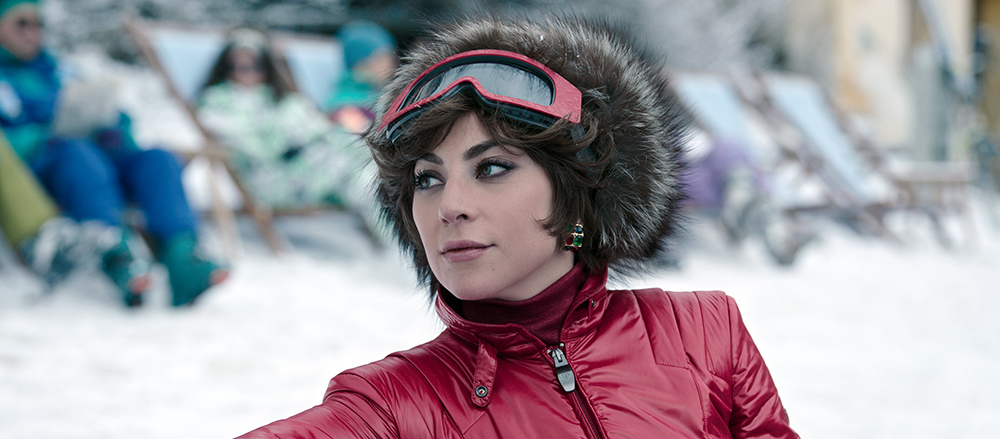Before he became Noted Auteur Ridley Scott, the English director made a big mark in advertising. In the late ’70s, Scott was hired to revamp the visual brand of Chanel No. 5 perfume. The commercial he made in 1979 would go down as an all-time classic: As a model lounges by a pool, the shadow of a private jet briefly darkens the Mediterranean sunlight. “I am made of blue sky and golden light, and I will feel this way forever,” intones the husky female voice-over. Then a hunky man magically appears and dives into her pool — no sexual overtones there.
Chanel No. 5 is just a perfume, but Scott’s visual magic is used to associate the brand with an intoxicating mix of power, lust, and wealth. You’ll never be as sexy as Catherine Deneuve, but you can go out on the town smelling like her, and that’s kind of like being made of blue sky and golden light, I guess?
It’s perversely appropriate that one of the people responsible for creating the visual language of luxury brand capitalism helms House of Gucci. “We’re not aristocrats,” says Maurizio Gucci (Adam Driver). In the late ’70s, the Gucci fortune was only a couple of generations old, but patriarch Rodolfo (Jeremy Irons) is instantly contemptuous when he finds out his son’s new girlfriend Patrizia Reggiani (Lady Gaga) comes from the petite bourgeois. Maurizio is in law school when he meets Patrizia at a party, and he has no intention of entering the chaotic family business. Rodolfo and his more competent brother Aldo (Al Pacino) believe Maurizio will be the future of the company, mostly because Aldo’s son Paolo (Jared Leto) is an idiot, which is why Rodolfo instantly pegs Patrizia as a gold digger. When he insists on marrying her, the groom’s side of the church is conspicuously empty, and Maurizio is forced to take a job at the Reggiani’s trucking company. (“Trucking? Mafia!” hisses Rodolfo.)
Patrizia’s not a gold digger, in that she sincerely loves Maurizio, but she’s not not a gold digger, either. Once she has the ring on her finger, the steel starts to show behind the velvet. Maurizio would be content with a fairly normal career, but Patrizia pushes him to be more ambitious. When Aldo calls to reconcile the Gucci rift, she’s adamant they return to the fold. Then she promptly starts maneuvering to put Paolo out of the picture.
Patrizia is an infamous figure in Italy, known as “the Black Widow” for ordering a hit on Maurizio in 1995. Lady Gaga plays her with what I can only describe as gusto. She and Scott know this is melodrama of the highest sort. When Patrizia and Maurizio have a tryst in his father’s office, it starts out sexy but devolves into a kind of slapstick ferocity. Driver seems to understand exactly the level of soap opera acting this story needs and delivers it nonchalantly. I suppose it’s hard not to wink into the camera when you’re doing a GQ cover shoot scene. Pacino, Leto, and Irons go full Dark Shadows. I wouldn’t call any of the Italian accents “great,” but they’re at least fun, like when an unrecognizable Leto bleats “She shake-a my hand while she knife-a me in the back!”
It’s corny as all hell, but it’s also pretty entertaining because you can tell these folks are having a good time. Scott’s lighting design is off the charts good, especially in an early Italo-disco sequence where he goes gaga with a light-up dance floor. His foreshadowing of the climactic murder is constant. When Patrizia confronts Maurizio’s mistress at a ski lodge, she barrels into the shot in a blood-red, skin-tight ski suit. Thanks to the ’70s Italian characters smoking like very fashionable chimneys, House of Gucci uses the mister as much as Blade Runner.
Ultimately, House of Gucci falls victim to the same problems Ridley Scott films have been having since Gladiator. There are a lot of good scenes that work on their own, but they never gel together into something greater than their sum. For example, Maurizio doesn’t drift away from Patrizia; he just seems to see another woman he likes and jumps ship. After luxuriating in Italian villas for two hours, the life-or-death drama at the end seems perfunctory. Like Leonardo DiCaprio in The Wolf of Wall Street, Lady Gaga’s portrayal of the antihero Patrizia is so charismatic and seductive that it undermines the film’s supposed deeper themes of the corrupting power of greed. The whole package comes across a little like The Godfather, if everyone involved were just a little stupider. I guess there will always be an appetite for watching awful people behaving awfully.
